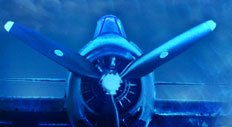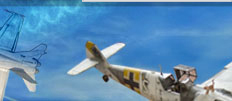|
A tragic situation exists precisely when virtue does not triumph
but when it is still felt that man is nobler than the forces which destroy him. [George Orwell]
Lieutenant General Frantisek Fajtl [1912-2006] was
one of the finest Czech WWII fighter pilots who served his
country during World War II on many battle fronts, ranging from the Battle for Britain in the West to the
Slovak National Uprising in the East. His wartime record was remarkable and his name could easily
serve as a dictionary definition of “national hero.” Yet shortly after the war, he was “rewarded” by
being dismissed from the army and imprisoned by the newly established communist regime in Czechoslovakia.
František Fajtl had endured innumerable hardships since
the annexation of Czechoslovakia by Nazi Germany in March WWII 1939. At that time he witnessed the tragic
consequences of the policy of appeasement promulgated by France and Britain. The formidable system
of border fortifications and fleets of well maintained biplanes were handed over to Hitler without
a single gunshot. That was a big blow to the pride of the Czechoslovak army which was getting ready
to defend the country against the looming German invasion. Fajtl and many other Czech pilots didn’t
settle for the disgraceful surrender and fled to France via Poland.
In France, Fajtl joined the famous French Air Force in May 1940 WWII,
where he flew Morane-Saulnier M.S.406 fighters against the advancing German blitzkrieg. Soon after the
defeat of France he escaped to the UK via North Africa. Once again, he didn’t hesitate to enroll as a
fighter pilot. Fajtl joined the Royal Air Force [RAF] in September 1940 where he eventually became the
leader of No. 313 WWII Squadron RAF commanding a crew of exiled Czechoslovakian fighters. At first, the foreign
pilots were eyed with much caution within the rigid RAF hierarchy, but under the leadership of Frantisek
Fajtl they gradually earned their due respect through their many dangerous missions in the Battle for Britain.
Flying Supermarine Spitfires, Fajtl himself shot down
four German airplanes [one short of qualifying for a flying ace] while escorting bombers attacking
north-west France. Many a time did Fajtl come within a hair’s breadth of losing his life or falling captive:
“My worst moments occurred when I was forced to a landing after
being shot by a German aircraft in northern France. I crashed into open terrain and my plane was on fire.
I was right in the middle of the battle front occupied by the enemy. I managed to hide and escape to
England via Spain so that I could go on fighting.”
Soon upon his return to England, Fajtl was awarded the
Distinguished Flying Cross and promoted to Wing Commander. However, he opted to drop in rank in order to
keep flying with his No 313 (Czech) WWII Squadron. In January 1944, Fajtl led a group of pilots to the Soviet
Union where they formed the first Czechoslovak Fighter Air Regiment which flew Lavochkin La-5 fighters
in support of the Slovak National Uprising in the final months of the war.
Fajtl’s record of military WWII service was truly exemplary.
He proved his determination
and unwavering courage in numerous battles across Europe, yet instead of becoming a national hero he
was to become an enemy of the country which he loved so dearly. Although both Fascism and Nazism were
defeated, they were soon followed by 40 years of Communism and the Cold War Period.
At first, Fajtl and other Czech airmen were greeted
with ovations upon their victorious arrival in Prague. But it didn’t take long for a new political
tide to sweep over the whole of Eastern Europe. It must be understood that Czechoslovaks felt bitterly
disappointed and betrayed by the West at the Munich Agreement of 1938, and the post-war desolation
played into the hands of socialist movements. New political sentiments along with repressive
strategies and intimidation of the Czechoslovak voters helped the Communist Party seize control
of the government and by February 1948 the takeover was complete. Since then any associations
with the West were to be condemned and repressed.
The Czech pilots who had served under RAF were
labeled as traitors of the new regime and sentenced to years of imprisonment and forced labor.
It was of no consequence that many of them had also fought on the Eastern front. Instead of
receiving medals of honor, the war veterans were dismissed from the army and locked up with
the very Nazi officers they had been fighting against for years. It was this cruel irony of
life that hurt Frantisek Fajtl most deeply. During the course of war he had managed to escape
the Germans, but in peace time he was imprisoned by his very own people:
“It was the saddest time when I returned home and was imprisoned.
I was sent to Mirov [prison for war criminals and political prisoners] and I left behind a family with a little
daughter and didn’t know what would happen to us.”
After 17 months Fajtl was released from the
labor camp but he was forced to live outside Prague, he wasn’t even allowed to have a telephone
and he could only take up menial jobs. Living under various restrictions for 40 years Fajtl was
fully rehabilitated only after the Velvet Revolution in 1989. He was restored to the rank of
Lieutenant General and received many honors including the highest Czech medal, the Order of the
White Lion, by Czech President Vaclav Klaus in 2004:
“I was very moved… I received it [the medal] in honor
of all my friends who had died… and I was very happy that it turned out this way.”
At long last, Frantisek Fajtl came to be publicly recognized
and duly respected by the Czech society which had done him so much injustice in the past. Fajtl’s consolation
at the end of his life was the great amount of support he received from the readers of his books about the
wartime experiences of Czech fighter pilots.
General Lieutenant Frantisek Fajtl died on October 4, 2006 at the
age of 94. He is survived by his wife Hana and two daughters.
Written by Patrik Gotz
|

















